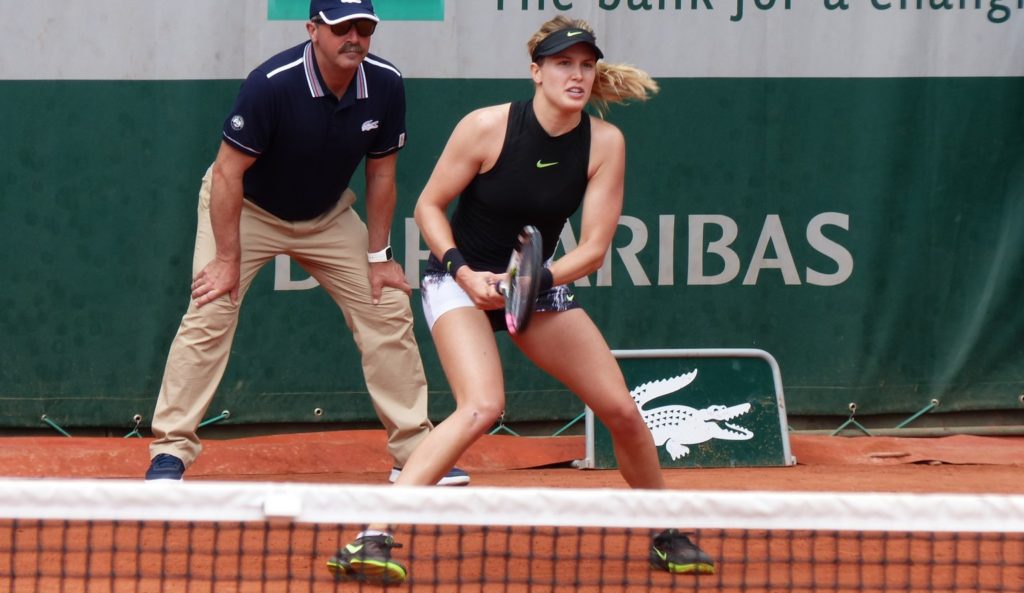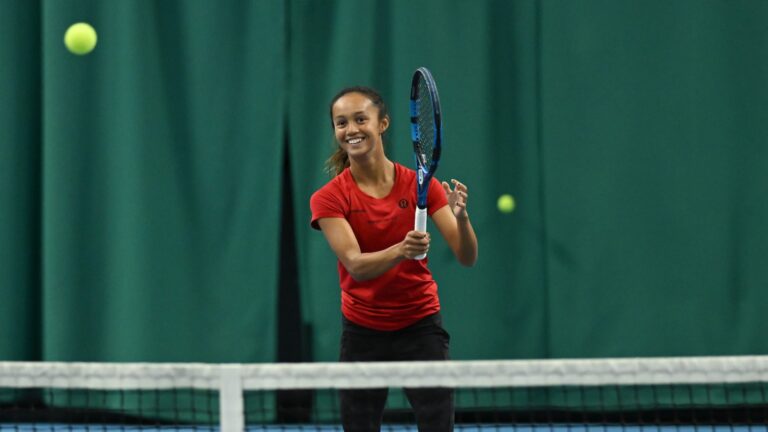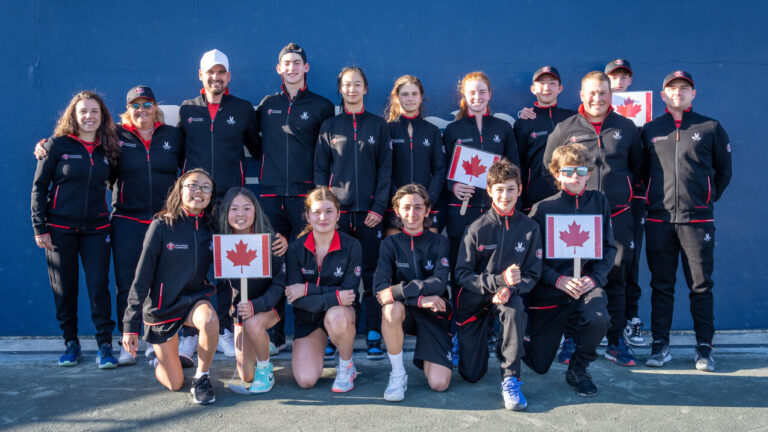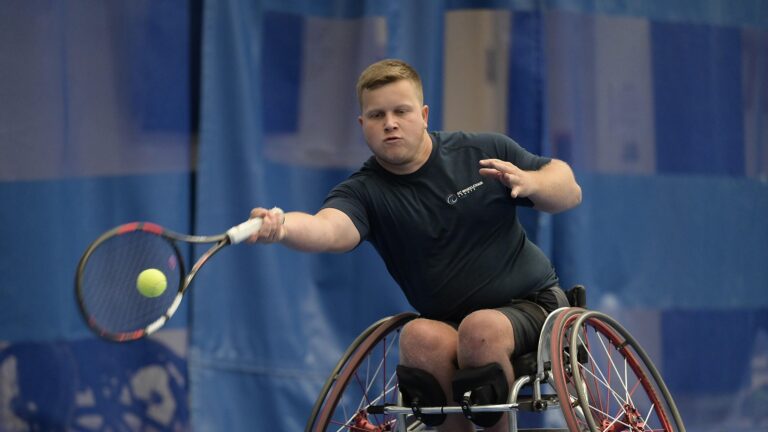
Genie Bouchard’s optimum mode for tennis is, in her own words, “controlled aggression.”
On Tuesday on Court Two at the French Open, Bouchard spent about half an hour putting on a display that can be best described as uncontrolled aggression. She was spraying balls – usually long – all over the court.
She hit a (forehand) winner on the second point of the match and didn’t hit another one (except for a smash) until the fifth game when she belted a forehand winner to make the score 4-0, 30-30 in favour of her opponent Risa Ozaki.
Bouchard still lost that game to fall behind 5-0 but she gradually got dialled in and managed to win two games before the No. 72-ranked Japanese wrapped up the set 6-2 in 37 minutes. The total of unforced errors for Bouchard was a staggering 24 – enough to lose a whole set.
She got off to a good start to the second set, leading 2-0 but Ozaki got back to 2-all before the No. 57-ranked Montrealer really found the range – pummeling her ground strokes and continually keeping the game but out-gunned Japanese on the run.
The final score wound up being 2-6, 6-3, 6-2 – and as Bouchard got better Ozaki began to make more and more unforced errors under a constant barrage of big shots.

In the final set Bouchard hit nine winners and inflicted 14 forced errors on Ozaki, who was so overmatched and had so little time to even plant to hit a normal ground stroke that she only committed two unforced errors.
It was an inspired performance by Bouchard who was anything but inspired at the outset of the match under mostly sunny skies and almost ideal temperatures. “I felt pretty nervous before the match because I didn’t know what to expect with the (right) ankle,” she said.
When she came out to play the sixth game of the first set she complained to her coach Thomas Hogstedt, sitting courtside, “I feel like I can’t move.”
In that game Bouchard whaled a forehand swing volley winner on the second point and the heretofore stunned and mostly silent (pro-Bouchard) crowd gave her a rousing cheer. That wasn’t surprising since she had made an egregious 18 unforced errors in the previous five games.
Bouchard’s explanation for her eventual dramatic reversal of form was and over-simplified, “I realized what was going on and was able to change it.”
A more likely explanation is that she just reverted to type – she has shown herself to be a quality player in the past and she just found a great groove and rode it right to the end of the match.
In the second game of the second set, Hogstedt had offered more encouragement, “more intensity between points,” he called out to her.
The standard of play she showed in the second and third sets made one almost feel sorry for the over-matched Ozaki. It was a standard reminiscent of the way she performed in her dramatic 7-5, 2-6, 6-4 victory over Maria Sharapova in Madrid earlier this month.
If she maintains that standard, and if the ankle holds up after a rigorous hour and 49 minutes on court with Ozaki on Tuesday, she should be at least 50-50 in her match Thursday against 17th-seeded Anastasija Sevastova.
“I’ve played her a few times,” Bouchard said about the 27-year-old Latvian. “She’s been playing well lately. She’s a tricky player – slice, mixing it up, slow balls. I’ll have to be ready for everything – play my aggressive game but also have patience, which I had a bit more of today in the second and third sets.”
Bouchard and Sevastova, who has been known to really get down on herself if things aren’t going her way, have played twice – both in 2016 with Bouchard winning on hard courts 5-7, 6-3, 7-6(4) in Qatar in February and Sevastova prevailing 6-3, 6-3 on grass in Mallorca in June.
In her post-match media conference, Bouchard sounded a little stuffed up and said she has “a small cold,” adding, “no big deal.”
After what she has come through with her ankle, she’s basically playing with house money. “I almost didn’t play so for me I was just super happy to decide to play, and super happy with a win,” she said. “When I’m on the court (I) try not to think about it, try to go for it, but definitely not really have any expectations.”
It is an approach that worked in her first round and one that could take her far in a very wide open women’s French Open in 2017.
RAONIC, ABANDA ON DAY THREE SKED
Milos Raonic will play his second-round match on Wednesday on the ill-fated Court One on Wednesday – third match on after a men’s and a women’s match.
Cozy Court One, widely known as “the bullring” will disappear next year as part of the Roland Garros renovation and expansion master-plan.
In the 3,802-capacity arena, Raonic will have his first meeting with No. 79-ranked Rogerio Dutra Silva of Brazil.
On Court Two, where Raonic and Genie Bouchard played their first-round matches, Francoise Abanda will face a challenging opponent in veteran (26) Caroline Wozniacki, the 11th seed, in the third match on court. Of some comfort to the No. 195-ranked Abanda will be the fact that Wozniacki has performed her Grand Slam poorest at Roland Garros – accumulating just 15 wins in 10 appearances compared to 34 in 10 US Opens – including reaching the final in 2009 and 2014.
It’s been a dream run through three rounds of qualifying and one match in the main draw for the 20-year-old Montrealer but Wozniacki’s athleticism and retrieving ability will severely test her ability to hit heavy off the ground.
NESTOR EXITS EARLY
Daniel Nestor and his French partner Fabrice Martin were beaten 7-6(4), 6-7(4), 6-3 in the first round Tuesday by the pairing of Santiago Gonzalez of Mexico and Donald Young of the United States.
After a one-sided first set tiebreak that the Mexican/American duo led 6-1 at one point, Nestor dropped his serve on a double fault in the second game of the second set and soon the score was 3-0. Gonzalez and Young had a great chance to close out the match when the Mexican served for the match at 5-3 but he obviously tightened up, hitting two double faults that contributed to giving back the break.
In the tiebreak that decided the set Gonzalez and Young led 4-2 before dropping five points in a row as Nestor and Martin, the 14th seeds, seemed to find their range.
But they lost it toward the end of the decisive set as Nestor dropped his serve to fall behind 4-3 and then Martin did likewise, pushing a backhand volley long on the ultimate match point.
“They played a little bit better than we did and I don’t know what else to say,” was Nestor’s succinct summation. “It’s always dangerous playing a singles guy like Young who’s just swinging out. When they play like that you’re not sure 100 per cent if they care if they win or lose. When you have that attitude it’s much easier to play any sport. They played pretty well and maybe we took too long to get going but we had moments when we played well.”
After a first-round Grand Slam event loss by a legendary doubles champion like the 44-year-old Nestor, the question about his future arises – will he be back at Roland Garros 12 months from now? “It’s very ranking dependant so we’ll see how everything goes at the end of the summer and the end of the year,” he responded.
He’s entered in the mixed doubles event with Alla Kudryavtseva of Russia.
After that he plans to play grass-court events in s-Hertogenbosch, Eastbourne and Wimbledon with Martin, but will team with Milos Raonic at Queen’s Club in London because his and Martin’s combined rankings wouldn’t have gotten them into the main draw at the ATP 500 event.
ADIL DOUBLES ‘DEUXIEME TOUR’
Adil Shamasdin of Pickering, Ont., advanced to the Roland Garros second round with Argentine partner Andres Molteni on Tuesday as they scored a 6-2, 6-4 win over Facundo Bagnis of Argentina and Albert Ramos-Vinolas of Spain.
Fresh from a victory at the ATP 250 event in Lyon, France last Saturday, Shamasdin and Molteni only really had one worrisome moment – after breaking Ramos-Vinolas to lead 2-1 in the second set, Shamasdin was broken and soon the Argentine/Spanish duo led 3-2. But that was really their last gasp as Shamasdin and Molteni dominated the last few games.
“I’m pleased with the win but hopefully we can come back a little bit sharper for our next match,” Shamasdin said. That match will be against either 13th seeds Marcin Matkowski (POL) and Edouard Roger-Vasselin (FRA) or Nick Monroe (USA) and Artem Sitak (NZL).
“I like his energy, he’s always upbeat, he’s always very positive,” Shamasdin said about the 29-year-old Molteni. “I think we complement each other pretty well. He likes to stay at the baseline but he actually helps me quite a bit on my service games. And he makes a lot of returns and it kind of eases me up on my returns and I can hit a little more freely.”
Regarding communication with the No. 55-ranked Spanish-speaking Molteni, Shamasdin joked, “my Spanish is great. I just say ‘si.’ Si is yes so if he tells me something I just say ‘si’ and it works.”
In a more serious vein, he added, “he can speak English very well so that’s not a barrier at all. He knows the game of doubles, I know the game of doubles, so we just go from there.”
At a career-best No. 47, Shamasdin should improve with the 90 points he earned with the first-round victory. He didn’t play Roland Garros in 2016 and vaguely recalls, “last year at this time I was probably in England just getting ready for the grass.”
PARIS POSTCARD
Canadian songstress Joni Mitchell once wrote a song called “In France they kiss on Main Street.” Well…in France and in Paris they kiss in lots of places including the Metro (subway) as this couple were doing oblivious to the world around them recently.









